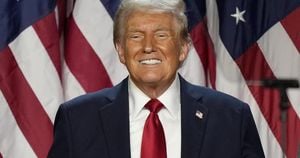On the global stage of geopolitics, few topics ignite as much tension and concern as nuclear weapons, and the recent discussions around Ukraine's potential nuclear weapon development have sent shockwaves through international relations. With the shadows of past conflicts looming large, the specter of nuclear capability raises urgent questions about security, sovereignty, and the balance of power.
Historically, Ukraine gave up its nuclear arsenal post-Soviet Union as part of the 1994 Budapest Memorandum, which promised security guarantees from key powers, including Russia, the Unites States, and the United Kingdom. Fast forward to today, and the geopolitical climate has shifted dramatically, particularly following Russia's 2014 annexation of Crimea and its aggressive posture toward Ukraine. Many Ukrainian officials are now voicing concerns over the effectiveness of these guarantees, with some contemplating the idea of reviving its nuclear capabilities.
Just recently, Ukraine's President Volodymyr Zelenskyy contended, "If we had nuclear weapons, would we have had the problem we have today?" This stark acknowledgment reflects deep-seated fears about national security amid rising threats from Russia. Zelenskyy’s rhetoric indicates not merely desperation but also hints at strategic calculations about deterrence: after all, countless analysts suggest deterrence through nuclear capability could deter aggression.
The concept of Ukraine pursuing nuclear weapons raises legal, ethical, and practical dilemmas. Firstly, the Non-Proliferation Treaty (NPT) seeks to prevent the spread of nuclear weapons. Transforming Ukraine back to nuclear status would not only violate this treaty but could also plunge the nation back to the very era it sought to escape. The international community would likely respond with heightened sanctions, isolation, and military build-up which can exacerbate tensions.
Yet, as Ukraine is embroiled increasingly with military confrontations, the practicalities of pursuing nuclear weapons cannot be sugar-coated. Such initiatives necessitate colossal resources, sophisticated technology, and years—or even decades—of development. Ukraine's nuclear program would need substantial investments, both financially and politically, which could be diverted from other urgent needs of the country facing economic downturns and infrastructural challenges due to war.
From the perspective of Western nations, discussions around Ukraine's nuclear aspirations also present a conundrum. NATO has consistently advised Ukraine on military support but has been hesitant to openly discuss any nuclear discussions. Washington, London, and other capitals have consistently stressed the importance of Ukraine’s sovereignty and territorial integrity, aligning these principles with NATO's collective defense mechanisms.
There’s also the issue of public sentiment within Ukraine. While some proponents might argue for nuclear capabilities as necessary deterrents, there remains significant opposition within the population. The horrors of the Chernobyl disaster and widespread nuclear anxiety serve as poignant reminders of the consequences of nuclear proliferation. Ukrainian citizens, having suffered deeply from conflict and crisis, often prioritize security and stability over the uncertainties of nuclear armament.
Meanwhile, with the backdrop of these discussions, Russia remains vigilant. Russian officials have reacted with immediate condemnation of any potential shift in Ukraine's nuclear policy. They assert any advancement toward nuclear weaponry from Ukraine would trigger extreme responses from Moscow. Foreign Ministry spokesperson Maria Zakharova warned, "Any attempts by Ukraine to acquire nuclear weapons will change the balance of power and will not be tolerated." Such provocations heighten fears of escalation between the two nations, potentially dragging NATO and other allies directly or indirectly involved.
Digging deep, analysts point to the fact: even if Ukraine sought to regain nuclear capabilities, achieving this would require cooperation from other nations—access to enriched uranium, development assistance, and even diplomatic cover. Simultaneously, the global non-proliferation community keeps vigilant tab on nuclear development endeavors worldwide. The repercussions of Ukraine's nuclear ambitions could reverberate beyond the borders, influencing other countries to reconsider their non-nuclear commitments.
It's this very matrix of options, risks, and strategic dilemmas where diplomatic efforts may be magnified. Ukraine must navigate the tightrope walk of strengthening its military capabilities and ensuring its sovereignty without igniting the fires of nuclear competition—an act often described as embarking on a slippery slope. The European Union and the United States remain pressuring for de-escalation, underscoring the imperative for diplomatic solutions over militaristic rhetoric.
Understanding the broader dissent is also pivotal. Engagement must happen not just from state actors but among civil society, fostering peace-oriented integration rather than fueling arms races. Think tanks and academic institutions have pivotal roles to play as mediators and educators, pushing for dialogue over detonations.
While it is easy to succumb to existential fears considering the potential for nuclear escalation, what is clear is the need for multifaceted approaches to resolve the turmoil between Ukraine and Russia. International discussions and frameworks focusing on diplomacy, security guarantees, and the resounding commitment to prevent nuclear escalation need urgency more than ever.
Will Ukraine seize the reins of its fate by embracing old strategies, or can new paradigms reshape the discussions on security and power? The answers lie not just within Ukraine's borders but rather weave through global corridors of influence, power, and the collective humanity's desire for peace over war.



